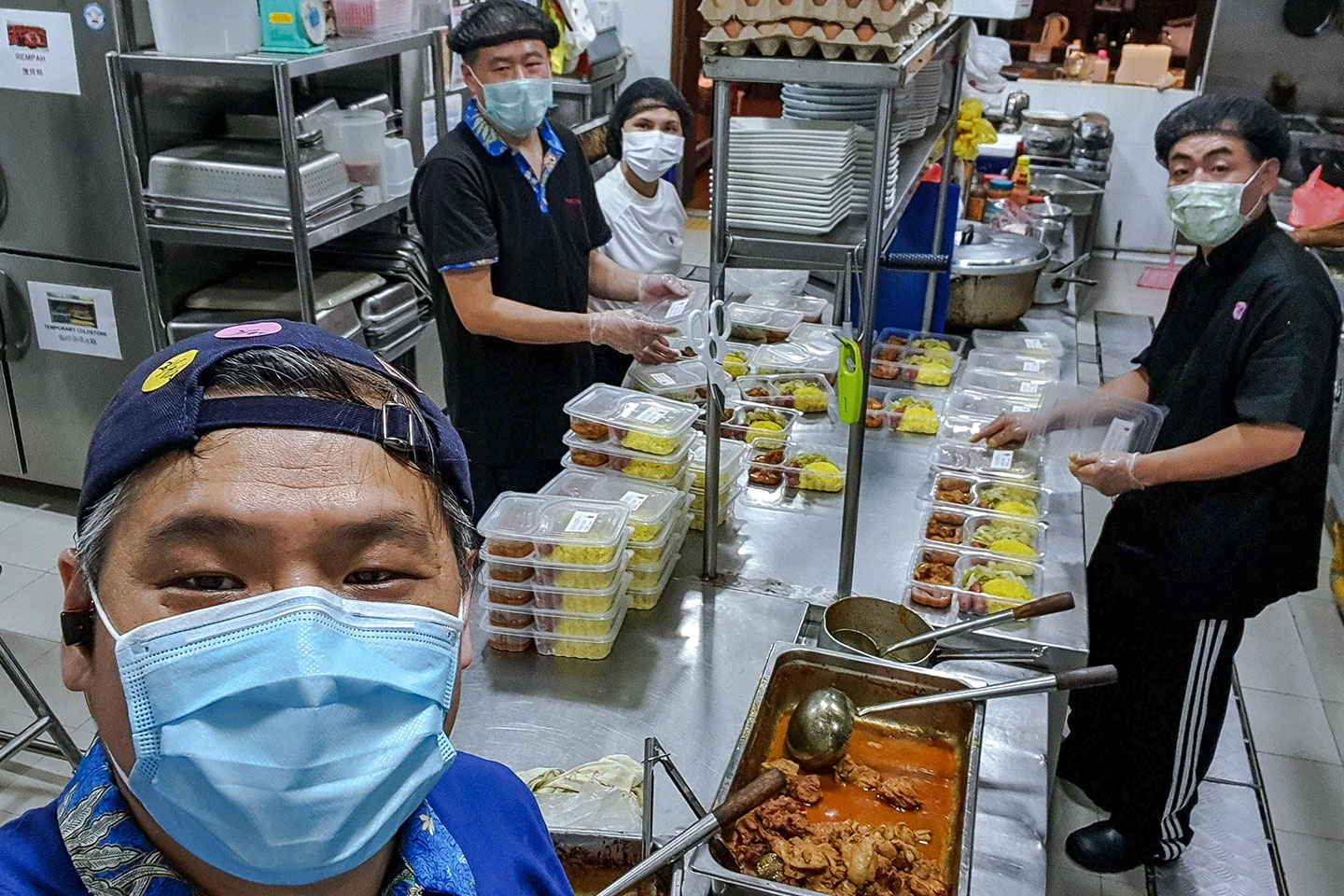Adapt and overcome: Our alumni in the F&B industry take on the pandemic
With many countries implementing lockdown-like measures all over the world, many businesses are being severely affected. And none more so than those who work in the food and beverage (F&B) industry.
With safe distancing in place, patrons are no longer able to dine-in at restaurants, and only takeaway and delivery options are available. This has severely impacted the industry.
A white paper co-authored by Visiting Professor Sherri Kimes (Dept of Analytics & Operations) found more than 90 per cent of F&B establishments in Singapore experienced revenue dips. To save on operating costs, 80 percent of restaurants surveyed reduced their staff.
While the situation is grim in the near term, many business owners also saw this is an opportunity to rewire business processes, while others are helping the less fortunate in the society and do good.
Outside-In spoke to alumni in the F&B sector and asked how COVID-19 have transformed their perspectives and business.
Ang Swee Heng (BBA 2017)
Co-founder and Managing Director of The Coffee Roaster
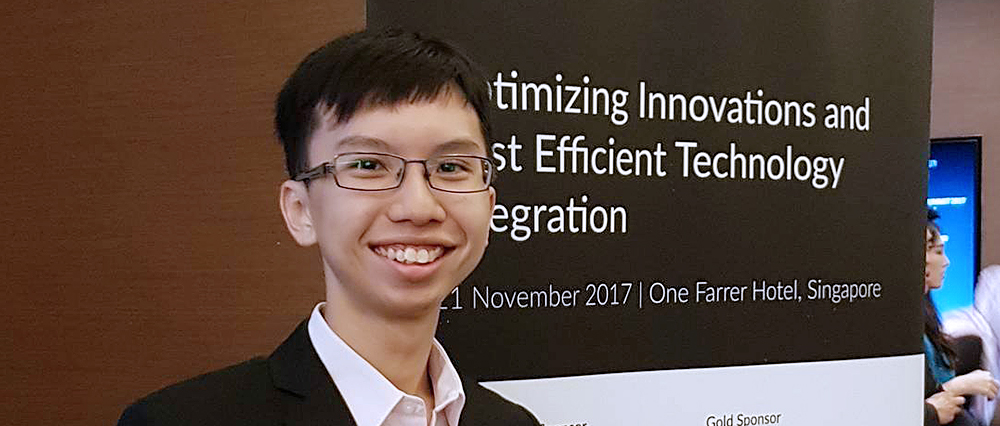
File picture of Swee Heng
Many specialty coffee players had to close operations, according to Swee Heng. “We were fortunate to be able to continue operating because we had a cooked food menu,” said Swee Heng.
Since takeaways and deliveries are allowed, Swee Heng initially started neighbourhood deliveries from his two cafes in the NUS and the Upper Thomson areas respectively.
He then expanded his deliveries island-wide for his food and drinks menu to reach out to more customers.
Swee Heng shifted his coffee-making corporate workshops online and added that many companies were interested in such online team-building activities.
“I think this has been an opportune time to reflect on our business model. In these challenging times, we get to examine our businesses closer in order to become a better version of the future,” he said.
Jocelyn Chng (EMBA 2012)
Managing Director of Sin Hwa Dee Foodstuff and CEO and co-founder of JR Group
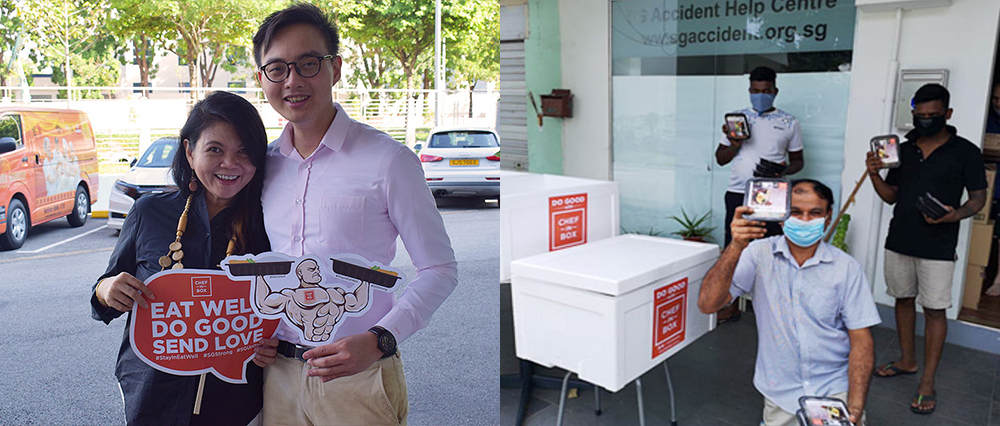
Left: Jocelyn Chng with her son Remus Joel Wong at a recent food pack delivery drive
Right: JR Group food delivery to recipients at the SG Accident Help Centre
“The F&B sector has been forced to adapt to meet the changing needs and to work with the new measures to keep everyone safe. I feel that this has made many businesses more creative and think outside the box as we venture into new grounds,” said Jocelyn.
She has been introducing new dishes for her restaurants’ takeaway and delivery menus, as well as working with more delivery partners.
Meanwhile, Jocelyn said that consumers are more open to convenient frozen meals that can be kept in freezers and reheated when required. As a result, she noted that there is more demand for Chef-in-Box, a concept that serves healthy food in microwavable boxes. She has since made the online sales model more robust to handle increased sales and also added more home delivery slots for her customers.
The less fortunate is not forgotten in this difficult climate. The JR Group is running an initiative where individuals or organisations would sponsor meals to be delivered to communities in need.
“Food is a major need for many. These include the elderly, school children who rely heavily on school subsidised meals and foreign workers. The mission of JR Group is to feed people well,” said Jocelyn.
Yilina Leong (BBA 2014)
Co-founder of Fossa Chocolate
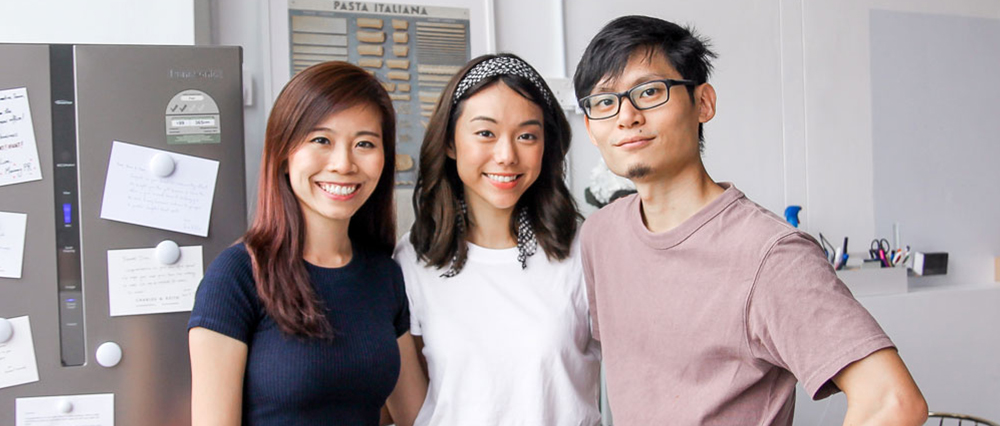
Yilina Leong (BBA 2014), co-founder of Fossa Chocolate
“The pandemic has impacted our business tremendously as we rely on heavily on physical retail sales, events and exports,” said Yilina. However, she believes that the situation also presents opportunities for companies to develop new capabilities and offerings.
With the disruption of day-to-day business, Yilina and her team have been innovating new products that they typically did not have time to work on under normal circumstances.
“We created limited-edition chocolates either made from rare ingredients, or special but time-consuming processes, and we also launched confectionary snack boxes that customers could savour while working from home,” she said.
The feedback has been positive, she added, with many happy customers making repeated purchases as gifts to friends/family whom they are unable to visit during this period.
Dinda Dwita Puspasari (MBA candidate)
Owner of Dinda’s Kitchen
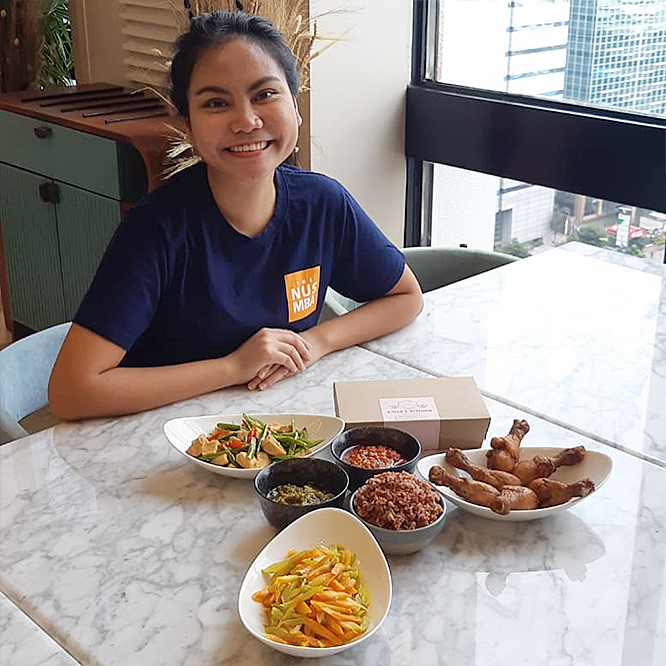
Dinda with the food products from Dinda’s Kitchen
MBA candidate Dinda Dwita Puspasari, who is a restaurant owner based in Jakarta, had to temporarily close one of her restaurants as its gastronomy food concept is not suitable for deliveries during Indonesia’s lockdown.
Undeterred, Dinda saw an opportunity in the catering market and opened a new business called Dinda’s Kitchen. “Companies in essential sectors would hire catering services to provide meals for their employees. This is why I decided to go into this space offering a range of options that can be tailored to customers’ preferences.”
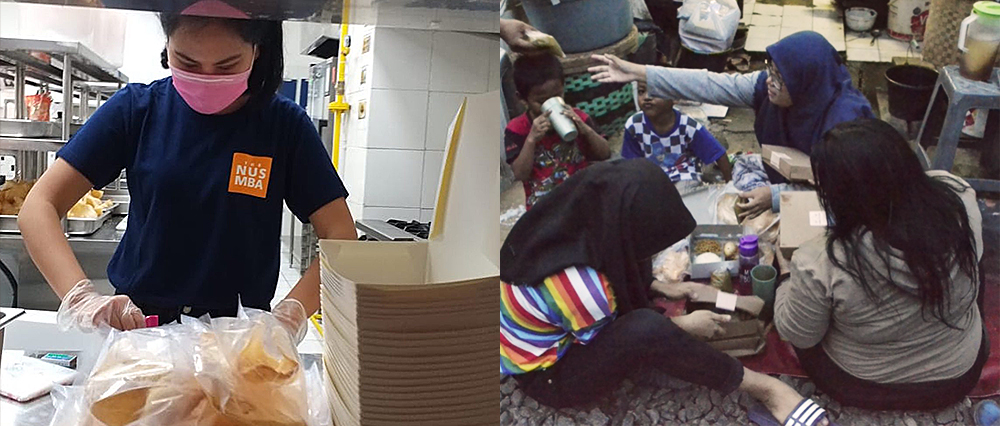
Left: Dinda preparing food packs for distribution
Right: Dinda’s Kitchen food packs handed out to a family in Jakarta
As the lockdown also took place during Ramadhan, she initiated a charity programme called “Iftar for All” which delivered break fast meals to those struggling to make ends meet.
“My employees are part of the community too. I see this as my responsibility to support the community. It feels great to help people,” said Dinda.
Tan Wang Cheow (BAC 1981)
Founder and Chairman, Food Empire
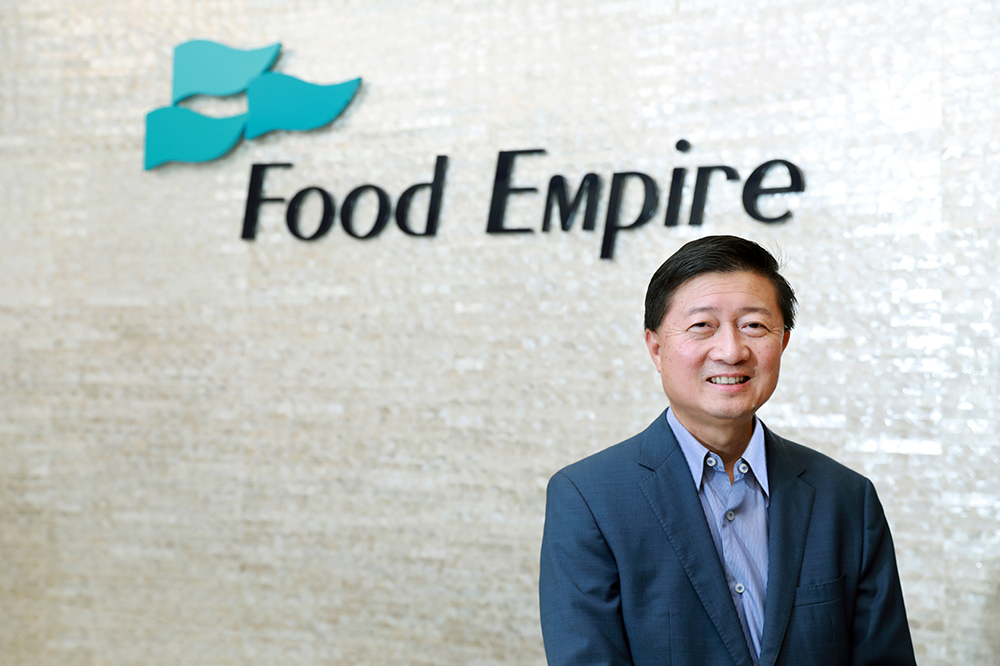
File picture of Wang Cheow
Food Empire has been carrying out its social work on a global scale, delivering its coffee products and surgical masks to needy households and frontline workers in countries such as the Philippines, Russia, Vietnam and Kenya, as well as regions of Eastern Europe and Commonwealth of Independent States.
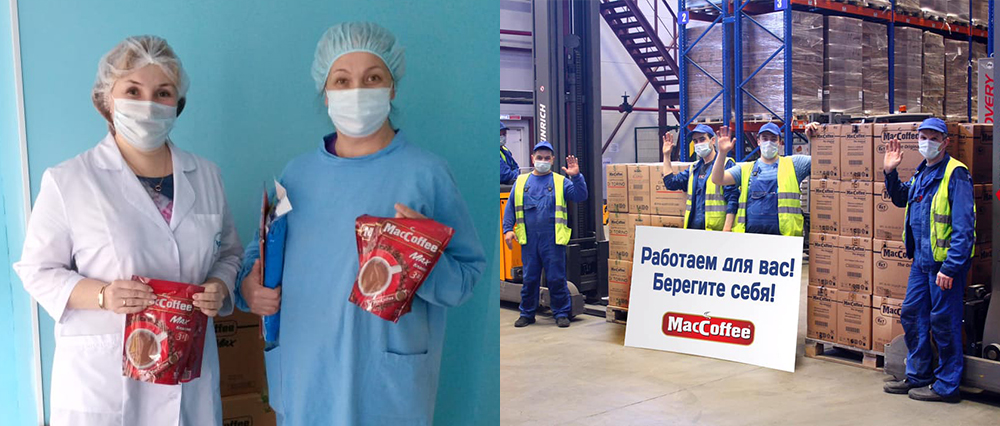
Left: Hospital workers in Russia with Food Empire’s MacCoffee products
Right: The Food Empire Russia team distributes MacCoffee to hospitals and needy households in seven cities in Russia
“You may not be able to help everyone but if you can just change someone’s life, you will always be blessed with contentment in your heart,” said Wang Cheow.
Woon Tien Yuan (BBA 2012)
Director of Killiney Kopitiam
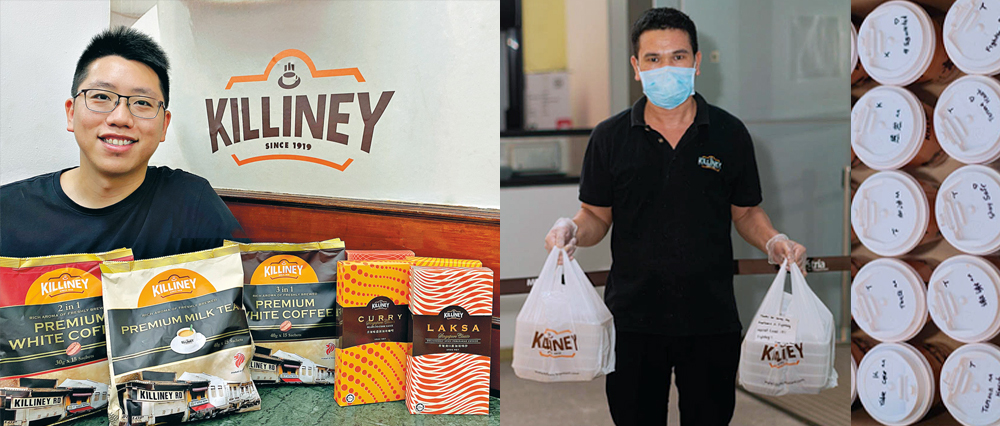
Left: Tien Yuan with Killiney’s new food merchandise
Right: A Killiney franchise operator providing support for frontline workers via food provision and words of encouragement written on coffee cups
Tien Yuan’s vision for the family business to embrace technology has served the Killiney brand well.
The brand has ramped up its e-commerce presence. For instance, the company has recently launched its own e-commerce store and will be partnering Lazada to roll out its product on LazMall.
Tien Yuan also added that Killiney is continuing its R&D investment into food technology firm Hoow Foods. The latter specialises in formulating healthier versions of food products. “For us at Killiney, this was one of the core reasons that prompted us to invest in food technology for long-term growth and sustainability,” he said.
Tien Yuan is also grateful for the founders’ foresight to purchase the shophouses they operate in. This means that they are not subjected to the ever-increasing rent and have better overall control of their costs.
Like many F&B players, Killiney is doing its part to distribute food and drinks to members of the society that needed assistance. For instance, Killiney is delivering its food and drinks to Gojek drivers and healthcare workers.
“Providing meals is a simple but yet impactful gesture to people,” said Tien Yuan.
Kevin Yap (UCLA – NUS Executive MBA 2019)
Third-generation chef, Straits Chinese by Guan Hoe Soon (1953)
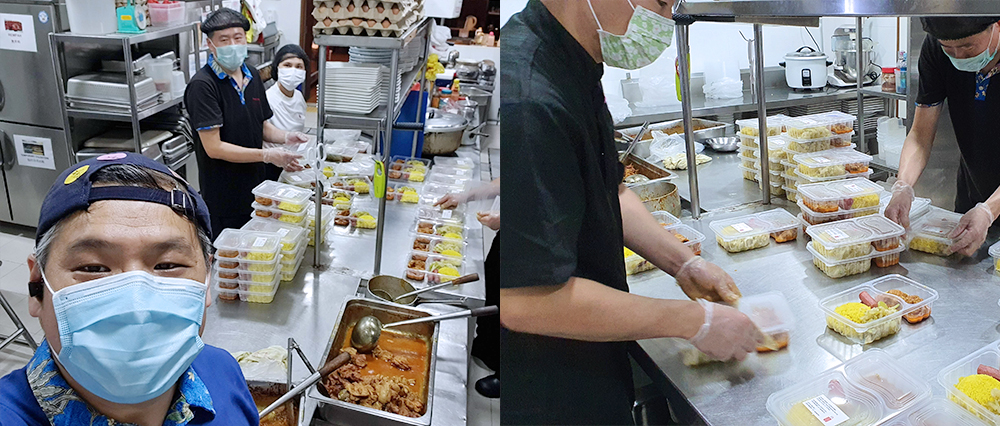
Left: Kevin (front) and his staff in the kitchen
Right: Straits Chinese staff preparing meals to be sent out to the community
“Our business model is significantly impacted because there are no events no events, dining, catering and tourism revenues,” said Kevin. “My dad Mr Yap Kow Soon, who is the second-generation chef, said that we have never experienced such a shock in the company’s history of 67 years.”
But Kevin remains undaunted. “Fortunately, we are classified as an essential business in this COVID19 pandemic and we knew we have to adapt quickly. Therefore, we have quickly reconfigured our restaurants and website to do takeaway and delivery meals. We have also pivoted with a new line of business to retail frozen and ready to eat meals too,” he said.
Kevin is also taking this downtime to plan for the future. He is currently looking at adopting a centralised kitchen model that can scale kitchen operations efficiently. He has also been sending his staff to training courses to boost their skills.
Kevin added that Straits Chinese has been working with individuals and organisations to sponsor meals to be delivered to members of the communities in need.
“In times of crisis, the vulnerable still need help and it is important to reach out to them,” concluded Kevin.
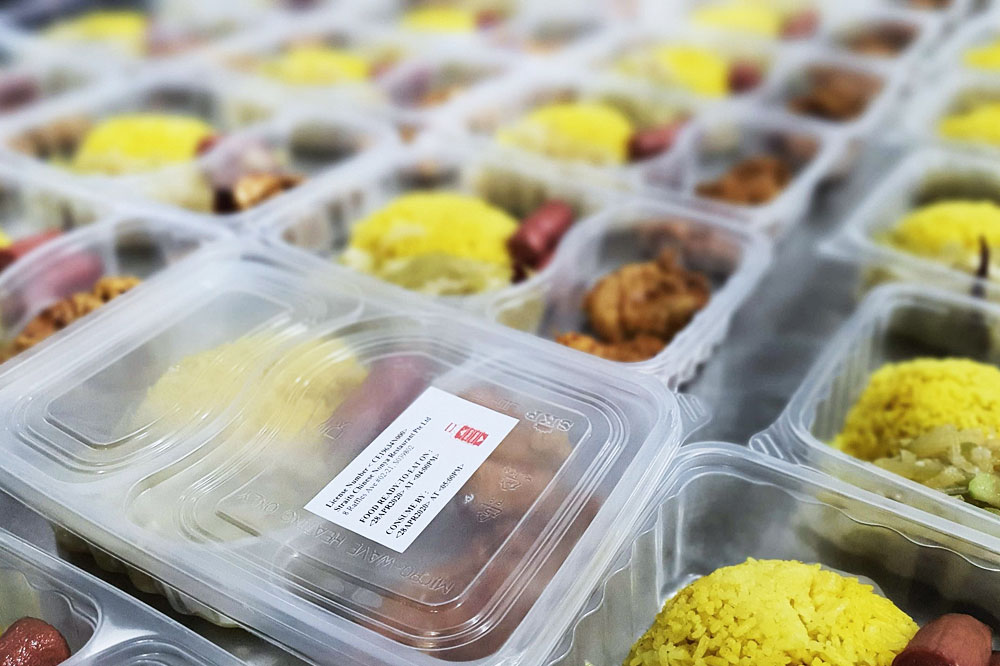
Food packs for the needy at Kevin Yap’s (UCLA – NUS Executive MBA 2019) Straits Chinese
Tell us what you think of this article




